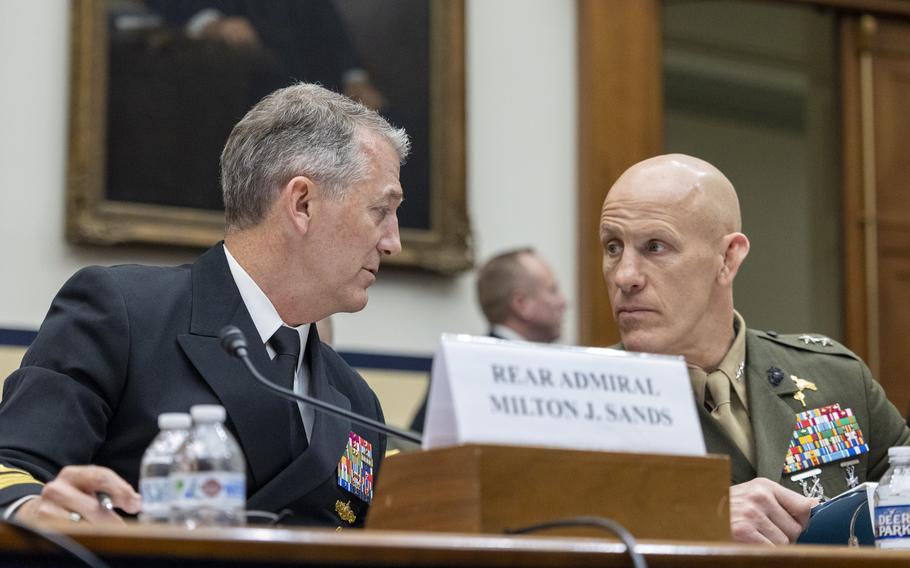
Rear Adm. Milton Sands, left, speaks with Marine Maj. Gen. Peter Huntley on Wednesday, Feb. 26, 2025, before a House Armed Services Committee hearing in Washington. (Eric Kayne/Stars and Stripes)
WASHINGTON — The commanders of special operations forces told lawmakers Wednesday that they were worried about the speed of technological advancement among adversaries and feared the U.S. was not keeping up.
The advantage that the U.S. had for decades in being able to “sense the enemy before they sense us” has eroded with the proliferation of modern technologies among great powers and terrorist and criminal groups, said Maj. Gen. Peter Huntley, who leads the Marine Forces Special Operations Command.
“They’re moving fast in terms of upgrading. We need to be able to move just as fast,” he said in testimony to a House Armed Services Committee subpanel. “That’s our main challenge going forward.”
Huntley said he was “greatly” concerned about the ability of special forces to keep pace with modernization and rapidly evolving technology such as artificial intelligence. Non-state actors, such as the Islamist militant group Al-Shabaab and drug cartels in South America, are evolving quickly, he said.
“What they bring to the tactical fight is, frankly, pretty impressive,” Huntley said.
Lt. Gen. Jonathan Braga, commander of Army Special Operations Command, said his forces struggle with rapid innovation due to lengthy bureaucratic processes that can make the simple modification of commercial off-the-shelf drones take months or years.
Lt. Gen. Michael Conley, commander of Air Force Special Operations Command, said modifications to his aircraft fleet also take too long. By the time an aircraft fleet is updated to modern needs, the technology is already irrelevant, he said.
“It’s this constant loop of trying to catch up with the enemy threat,” Conley said.
To make up for the gap, Air Force special operations forces have been “training our way out of it” by developing new tactics and procedures, he said.
“But that’s only a small piece of what we really need as far as advanced modifications,” Conley said.
Rear Adm. Milton Sands III, commander of Naval Special Warfare Command, said the challenge and priority for his command is rapidly getting equipment required for the modern battlefield into the hands of service members.
Braga suggested that could be achieved through better streamlining of innovation, funding and oversight processes. Huntley said special forces must move quickly to remove barriers to modernization as technology continues to transform warfare.
“That’s just kind of where the tactical world is right now and that’s where it’s going,” he said. “We can identify that, we know what we have to do, but to be able to get those capabilities into the hands of our operators, or our small tactical units, I would describe as critical.”